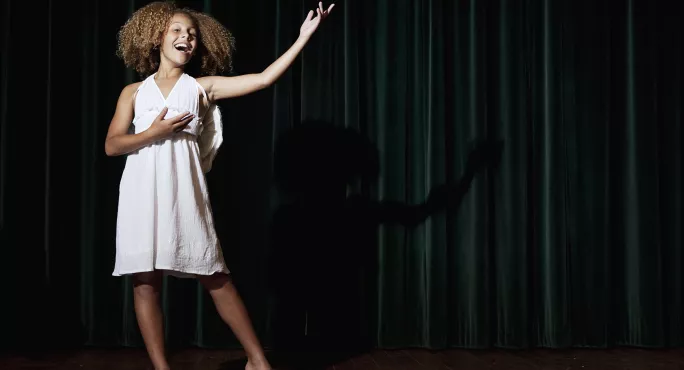
- Home
- Teaching & Learning
- General
- Could drama smooth the transition to secondary school?
Could drama smooth the transition to secondary school?

Let’s talk about “Sam”, a P7 pupil. Sam is a great kid, works hard, hangs with a good group of friends and is looking forward to going to secondary school.
Just the other day she said that she’s going to miss her teacher, but she’s really looking forward to experiencing new subjects, meeting new friends and teachers, and participating in all the after-school clubs.
But here’s the kicker. Sam’s dad called and asked if her teacher could give him some advice about Sam and the move to secondary. The teacher said not to worry, that the school had shared all her information, results, ASN (additional support needs) paperwork and that she had participated well in transitions days; the teacher even mentioned that the secondary staff thought that she did some great work with a poetry “bridging unit” that Sam started in primary and is continuing with her secondary English teachers.
Dad was pleased, but the teacher could tell there was something else that was bothering him. Then he said: “The thing is, I know that Sam is looking forward to moving to secondary, and I’m delighted that she is doing so well. It’s just that, well, I’ve been offered a new job and, er, it means that we will need to move away. So, Sam won’t be able to go with her friends to the local secondary school. Are you able to give me any advice, as I’m not too sure what to say to her?”
- Long read: Are we getting lost in transition?
- Related: Supporting the secondary school leap of faith with ‘transition teachers’
- Covid impact: How a drone is helping children move up to ‘big school’
The above scenario is an example of the multiple and multidimensional transitions (MMT) that young people and their families can experience during primary-secondary transitions (see Professor Divya Jindal-Snape’s work in this area) - in other words, there is often more than one big change pupils are going through.
My research team and I chose to frame a pilot study using MMT and drama education to investigate how drama might support primary-secondary transitions. We opted for drama as it is a subject and pedagogical approach that enables pupils to take on the roles of people other than themselves and to explore their perspectives and experiences. We devised four one-and-a-half hour drama workshops for pupils to use the aesthetic of theatre and drama to create fictional worlds, drawn from the real world, and negotiate new understanding of complex and often abstract constructs, such as primary-secondary transitions.
Initial preliminary data analysis suggests that using drama and MMT together enabled the young people to develop their understanding of the multiple aspects of transitions. Pupils indicated that they enjoyed learning through drama as they were able to relate to the roles with their own transitions.
As such, learning about transitions through drama enabled pupils to create real-life scenarios that helped them to depersonalise their actions and reactions through the security of the role. This appears to have supported pupils to explore and reflect on their own (and others) transitions’ thoughts and feelings (positive, negative and mixed) with peers and school staff through the safety of the drama world.
Overall, pupils indicated that they developed their confidence and felt less worried about their transitions. However, some pupils suggested that they were still anxious about their transitions and didn’t feel completely confident. Therefore, using drama and MMT together appears to help most pupils to understand the process of change that they are experiencing and how to manage it.
The intriguing idea starting to emerge is that drama and MMT have, for most pupils in the study, improved their confidence, self-esteem, social and emotional development, self-advocacy, resilience and opportunities to have their voice heard during transitions.
These are all important skills to develop in life, particularly during primary-secondary transitions, as research indicates that there are often dips in pupil attainment, motivation and school engagement, alongside an increase in school absenteeism and drop-out post-transfer. Pupils can also experience a poorer sense of belonging with negative implications for their social and emotional wellbeing.
However, at this stage, we are unable to say that the drama and MMT work supported all pupils, as a minority of pupils reported that the intervention did not alleviate all their transition concerns. My research team and I hope to report on initial data findings in the coming months and implement the study across the local authority involved in due course.
Dr Will Barlow is a senior lecturer in education at the University of Aberdeen. He tweets @DrWillBarlow
You need a Tes subscription to read this article
Subscribe now to read this article and get other subscriber-only content:
- Unlimited access to all Tes magazine content
- Exclusive subscriber-only stories
- Award-winning email newsletters
- Unlimited access to all Tes magazine content
- Exclusive subscriber-only stories
- Award-winning email newsletters
You need a subscription to read this article
Subscribe now to read this article and get other subscriber-only content, including:
- Unlimited access to all Tes magazine content
- Exclusive subscriber-only stories
- Award-winning email newsletters
- Unlimited access to all Tes magazine content
- Exclusive subscriber-only stories
- Award-winning email newsletters



